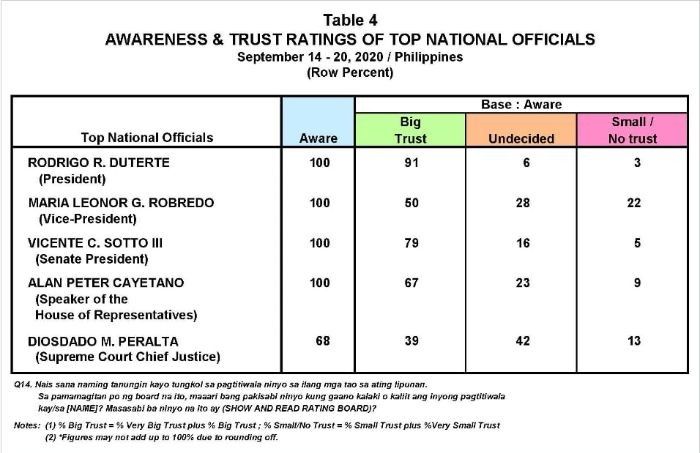Disbelief is what critics felt over sustainably rising approval rating of President Duterte in a recent Pulse Asia survey. Topping over his closest political rival VP Leni Robredo, the president gained 91% for both performance and trust rating. Tailing him are his close allies Senate President Vicente Sotto III and Speaker Alan Peter Cayetano. And maybe due to limited awareness with the judiciary, the Chief Justice did not bode well with the approval rating survey.
The roots of skepticism
The underlying basis of skepticism may stem from the roots of random origins.Among the firsts are numbers and duration. The first of layman’s impression is how on earth can a disproportionate number of 1,200 participants for a very short span of time — September 14 to 20—reflect the entire sentiments of 61 million voters in the Philippines? Of course, Pulse Asia could easily debunk the skeptics not only with its scientific methodology but also its showing of accuracy and reliability of the number of surveys in previous years.
However, cynicism has the reason to persist in the light of the quality of response by the administration to the challenges of pandemic crisis for the past seven months. As we are seeing, the coronavirus incidents continue to plague the country surpassing the 300,000 mark, ranking the Philippines among the world’s top 20 countries of having the most number of coronavirus cases. To many, it may indicate inadequate response if not a dismal failure to slow down the corona outbreak.
Malacañang was quick enough, though, to defend the high approval rating with a litany of efforts being undertaken. It took pride with the passage of “Bayanihan to Recover as One” which paves the way towards recovery programs, economic stimulus packages, and financial aid to displaced employees and to other informal sectors. It is not to mention other capability-building measures and response initiatives to fight coronavirus.
But a big question that craves for a credible answer is: how did the allegations of massive corruption against Philhealth executives, escape from the perceptive minds of the survey respondents? Thus, to find contextual answers to the relentless questions over the authenticity and reliability of the survey requires a closer scrutiny on the type of questions themselves.
Is it in the framing of question or the frame of mind?
On one hand, if what was being asked is about the performance of the president and how much trust he deserved to earn, then it appears to be president-centric question. It simply means that the respondents were focused on the president. It is like betting on a horserace. You don’t have to rate your personal strength and qualities. Before you place your bet, you have to rate your horse based on his past performance.
On the other, it may differ in results if the questions are directed towards the respondents themselves. For example, in a “Covid-19 Mobile Survey” by SWS last May 2020, they asked 4,000 participants about the quality of life at the height of corona pandemic. And lo and behold, in stark contrast to the Pulse Asia survey, it was revealed that “83% said their quality of life got worse.” In this case, it is not the horse you’re betting on; it is your own life. You are your own horse. Your response to the survey would come directly from the horse’s mouth, so to speak.
What’s inside the Filipino frame of mind?
If it is not in the framing of questionnaire, let us go deeper in to the frame of mind of the Filipinos.
Historically, we tend to forget and tilt to the feeling of forgiving the blunders of our leaders. But what we can never forget those good things promised or, better still, delivered to us, even halfway. We become appreciative and grateful even the results suggest mediocrity. Even if, for example, there were a lot of complaints related to the distribution of social amelioration fund; even if different issues were mounting over the responses of coronavirus pandemic.
Filipinos also tend to admire leaders who can identify with them – their struggles and aspirations. Even if others may say that not much positive changes in the their lives are unfolding. We patronize leaders whose language we can understand. And we associate with them. We hold up high leaders whom we perceived to be passionate in fighting for our causes. Even if others would say that these are promises in empty shells. Well-entrenched in Filipino mentality are those campaign promises that we romanticize with like to stop corruption, curb criminality and alleviate poverty. Sometimes, we find it hard to separate the shadow from the substance; to distinguish between the devil and the deep blue sea, so they say.
If the responsive efforts of the administration to fight coronavirus, however, unsatisfactory to critics, have trickled down to the masses, then the latter perceive them as acts of good performance, even if others would perceive that what they received were mere leftovers. That mindset creates a positive ripple for scoring performance rating.
Further, the strong condemnation by president Duterte against corruption in Philhealth must have earned and sustained for him with high trust rating. It means that we are holding on his promise of stopping corruption. Enjoying an abundant trust, he will not be dragged into a controversy even if he was the one who appointed the top executive into office. Any allegation of corruption will be exclusively assigned to the suspected culprits as if command responsibility doesn’t matter. This kind of perception insulated him from the controversy that his trust rating remains high.
The equation is simple: If a presidential appointee is embroiled with any anomalous government deals, then he betrayed the president’s trust; ergo he is guilty of breach of people’s trust. Duterte’s trust = people’s trust.
Either a slash or a plus
We have to be mindful, however, of what the future will bring. If the frame of mind of the Filipinos is the underlying element of the whole survey results, then it is subject to changes, either for the better or worse. How can sustainably increasing approval rating be sustained in the coming days will all depend on different but relevant realities in our socio-economic as well as political landscape.
Either a slash or a plus remains to be seen. We are not sure if coronavirus will continue to plague the country and wreck havoc to the lives of the people. That will be a score-changing reality.
Another x-factor is the purse management. Thus, a stronger whip on congress to end the row over speakership is a compelling necessity, otherwise non-approval or reenactment of the budget for 2021 may end up with non-inclusion of most pressing expenditures related to fighting coronavirus. Worse, it may have a backlash on the approval rating when the next round of survey comes.
Continue the favor or change the flavor may depend on any twist of events in the coming days.


